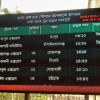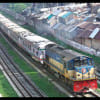Train services remain poor
Although nearly three and half months have elapsed since the government increased the train fares, the railway services remain horribly poor as were in the past. There is not adequate number of trains, and commuters suffer from frequent disruption of train schedule. On top of all this, existing train compartments are not fit for use as the seats are torn and toilets filthy and bug infected.
Despite being one of the cheapest, safest and sustainable public transport systems the railway sector has never received the due attention from the authorities. Due to lack of investment, improvement plan and corruption it is struggling to survive in the face of competition from other transport systems. There is also vested interest of transport businesses behind this sheer disregard.
Though the general people are interested to use this mode of travel, the poor condition of railway services hardly encourages people to opt for train rides over bus rides on long-distance routes. In the present case, commuters are not getting promised improved services despite bearing increased train fares. Moreover, now the government has a plan to readjust the train fares every year. Earlier, train fares used to increase after 10-15 years. If the services remain poor then there is little justification for putting extra burden on general public. We believe that there is no reason why Bangladesh railway cannot be turned into a profitable entity if proper modernisation initiatives are undertaken to improve the performance of a system that the vast majority of the middle income group would chose over other modes to commute long distance.

 For all latest news, follow The Daily Star's Google News channel.
For all latest news, follow The Daily Star's Google News channel. 








Comments